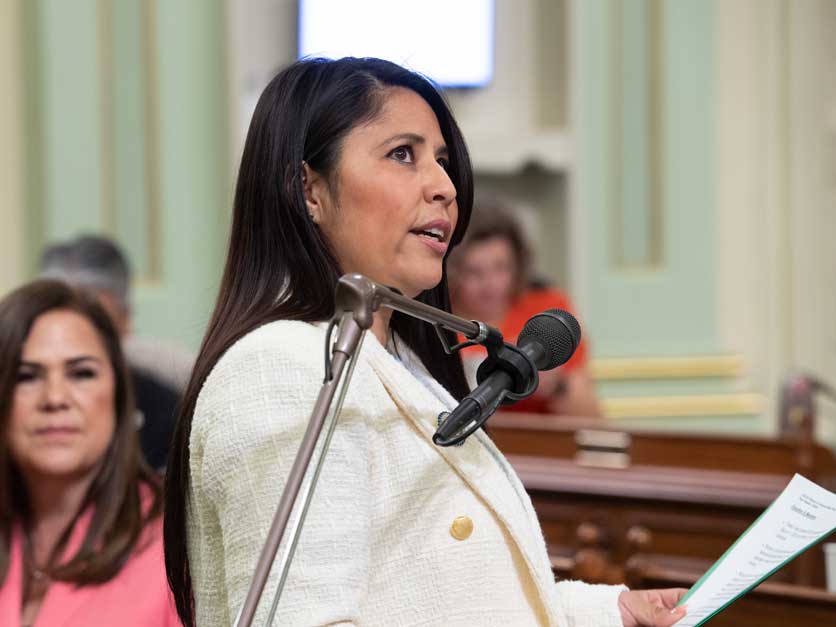Lawmakers have launched the first volleys in policy battles over farmworker protections to play out over the coming months. During a lengthy hearing last week, Democrats grilled state agencies over perceived lags in enforcement.
The forum teed up arguments for a state audit in the works and a bill to boost farmworker housing. Lawmakers are riding on the success of a controversial measure to overhaul farmworker union elections and the fact that the new Senate and Assembly leaders are strong proponents of farmworker rights.
“Despite these recognized health and safety issues and persistent labor abuses, and despite years of historic budget surpluses, the well-being and rights of farmworkers has been left largely unenforced,” said Assemblymember Liz Ortega of Hayward. The chair of the Labor and Employment Committee made her remarks in opening an informational hearing last week on the “lack of labor enforcement” for farmworkers. “Ensuring workers can safely do their jobs and enjoy basic labor rights must be—and will be—a priority of this committee.”
The three-hour hearing consisted of testimonies from more than a dozen labor advocates, followed by pledges from labor and workplace safety officials to investigate more employer violations.
As the state officials later concluded, many of the labor arguments were not new to the Legislature or regulatory arena.
Edward Flores, an associate professor in sociology and faculty director at the UC Merced Community and Labor Center, acknowledged that California has led the nation in farmworker protections—from an outdoor heat illness standard to wildfire smoke protections, the second-highest minimum wage in the country and agricultural overtime requirements. The state’s workplace safety regulator, known as Cal/OSHA, is also set to approve a new indoor heat illness standard.
Flores charged that compliance with these “high standards” is lacking. With funding from the California Department of Public Health, his center surveyed farmworkers on health issues and published the results last year. The researchers found a trend of chronic health issues and “troubling rates” of employer noncompliance with health and safety standards. Many respondents expressed a high level of fear over family separation due to deportation, and Flores warned that the closure last month of Prima Wawona, a Fresno-based stone fruit producer, could lead to as many as 10,000 workers without jobs.
He recommended the state invest more public resources into protecting workers’ rights through education and enforcement and to increase access to economic and healthcare safety nets through Gov. Gavin Newsom’s Health Care for All initiative. He also pushed for high road agricultural development through USDA’s new Farm Labor Stabilization and Protection Pilot Program.
Last week the Newsom administration announced it has allocated more than $114 million to advance careers for farmworkers, as well as for oil and gas workers displaced by the clean energy transition and for young or underserved Californians. Of that, the Employment Development Department (EDD) has allocated $9 million to 11 organizations to implement projects that train farmworkers for new careers. The goal is to provide essential skills that can lead to upward mobility and higher wages.
The Employment Training Panel, meanwhile, has set aside $10 million for similar grants. EDD has also dedicated $7 million specifically to aid farmworkers who have lost work due to the Prima Wawona closure.
CDFA Secretary Karen Ross said the programs are “key to attracting, supporting and providing high-quality jobs and leadership opportunities for a diverse agricultural workforce.”
 Asm. Liz Ortega, D-Hayward
Asm. Liz Ortega, D-HaywardAdding to Flores’ analysis, Antonio De Loera-Brust, communications director for United Farm Workers (UFW), blasted Cal/OSHA for dangerous working conditions in agricultural fields. He noted the agency received nearly 8,000 COVID-19 workplace safety complaints in 2020, which resulted in 627 inspections and 32 citations.
“More needs to be done to enforce farmworker rights and to empower farmworkers to enforce their rights themselves,” said De Loera-Brust.
UFW has found success with this argument among policymakers in Sacramento, adding to a wave of recent victories among labor interests. Bowing to pressure from President Joe Biden and other Democratic leaders in 2022, Newsom struck a deal with the labor group to enact a representation system known as card check, which allows unions to collect and submit signatures to organize workers in place of secret ballot elections. The governor fast-tracked cleanup legislation last year but the regulatory implementation has still raised alarms among farm groups.
The Agricultural Labor Relations Board (ALRB) has certified two UFW card check petitions. Yet it is still investigating the alleged mishandling of ballots for the first election. Attorneys for DMB Packing, known as DiMare Fresh, have charged that UFW included ineligible workers in the union count and coerced workers into signing ballots without fully understanding the process. UFW narrowly won the election, convincing just 51% of the workers to unionize. It had failed to win over the same workers just a month earlier, when ALRB determined the union had not gained the majority of the vote.
Despite the labor victories, farmworker advocates from Teamsters Local Union 856, California Rural Legal Assistance, Worksafe and several other groups chastised farm labor contractors over pesticide exposure through spray drift, heat illness, wage theft and retaliation.
“A lot of the things that were mentioned here are not new,” said Sarait Martinez, executive director of Centro Binacional para el Desarrollo Indigena Oaxaqueño. “This has been the reality of farmworkers.”
Asm. Joaquin Arambula of Fresno, who has authored bills aimed at ramping up air quality regulations to protect San Joaquin Valley workers, shared the concerns over heat protections and hoped that all farmworkers would unionize to ensure their rights are protected.
Arambula has filed a measure to address an issue he argues unfairly disrupts the lives of farmworkers and their families. Assembly Bill 2240 would prohibit the California Department of Housing and Community Development from closing temporary farmworker housing facilities when work dries up in the offseason. The authority operates 24 housing centers for farmworkers.
Ortega also has plans for improving the lives of farmworkers. During her committee hearing, she vowed to submit a request to the state auditor’s office to investigate Cal/OSHA and how it has handled the claims cited by advocacy groups.
“We're talking about years and years of workers in our farms being disrespected and not having access to basic needs that we as the state of California should be giving,” said Ortega. “I don't want to hear any more excuses. It's excuse after excuse, year after year—under-resourced, underfunded. We just came out of billions of dollars in surplus.”
Defending the administration, Sebastian Sanchez, deputy secretary of agriculture and immigrant workforce at the Labor and Workforce Development Agency, stressed that the organization has been well aware that “farmworkers continue to experience violations in the workplace and that there are severe obstacles in front of them to report those violations.”
He detailed efforts across agencies to educate farmworkers on their rights, extend the hours of their complaint hotline and revive a project for sanitation and in-field inspections. The agency has submitted a budget request that would bump up rural engagement as well.
“We have prioritized recovering that confidence and expanding our reach into farmworker communities where we have historically not had contact,” added California State Labor Commissioner Lilia García-Brower. “The structure of the agricultural industry—as you all well know—facilitates violations.”
It’s easy to be “in the know” about what’s happening in Washington, D.C. Sign up for a FREE month of Agri-Pulse news! Simply click here.
García-Brower criticized the subcontractor model for farm labor, arguing it creates barriers to enforcement and enables systemic violations. She has worked to fill staff vacancies in the commission, increase farmworker access to resources and invest in relationships with community leaders.
In response to allegations of not acting on claims, García-Brower noted that 90% of the claims the commission receives are not entered as formal cases, since the agency does not have jurisdiction or the worker has not identified an activity that counts as protected.
 Edward Flores, UC Merced
Edward Flores, UC MercedDebra Lee, acting chief of Cal/OSHA, pledged to increase the agency’s presence by establishing an agricultural enforcement unit, along with additional offices in Fresno, Riverside and Santa Barbara. Like García-Brower, Lee said the agency has been working hard to recruit, hire and retain its workforce. She explained that Cal/OSHA’s pesticide control unit quickly responds to issues with hazardous chemicals at workplaces, in coordination with the Department of Pesticide Regulation.
Agricultural organizations did not step in to defend the regulatory process or employers during the public comment portion of the hearing. In a statement to Agri-Pulse, however, Michael Miiller, director of government relations at the California Association of Winegrape Growers, called it laughable to consider the hearing informational, since the lawmakers “were creating a platform to sound off.”
Miiller explained the initial intent for informational hearings was to gather facts to inform policy, but they have evolved into echo chambers that support predetermined conclusions. He pointed out that Ortega worked at the Alameda Labor Council before taking office and said the committee did not invite agricultural organizations or employers to participate.
According to the independent research organization OpenSecrets, the labor sector financed the bulk of Ortega’s campaign for office in 2022, with about $600,000 in contributions. Ortega’s office did not respond to questions from Agri-Pulse over the imbalance in the selection of hearing panelists.
Yet the Bay Area progressive is not alone in the Legislature for having such close connections and strong support from labor interests.
The committee held the hearing just two days after Senator Mike McGuire of Healdsburg saluted the work of labor unions during his swearing-in ceremony as Senate president pro tempore. Among the many priorities covered in the inauguration speech, unions, farmworkers and worker rights got the nod. McGuire took pride in California raising the minimum wage, expanding sick time and maternity leave, and tackling income inequality.
“And let's be crystal clear who did this,” he said. “Unions did this in the state of California.”
He recognized labor leaders “who are fighting on behalf of working families day in and day out” as well as farmworkers, “who are the heart of America's agricultural economy.”
Asm. Robert Rivas of Salinas, who took over as Assembly speaker last year, has more direct ties to farmworker issues, having grown up in a farmworker family and, in the Legislature, fought to expand farmworker housing and health and safety protections. He has signed on as a co-author to Arambula’s housing bill.
Both McGuire and Rivas will play critical roles in advancing any farmworker legislation this year.
For more news, go to Agri-Pulse.com.


